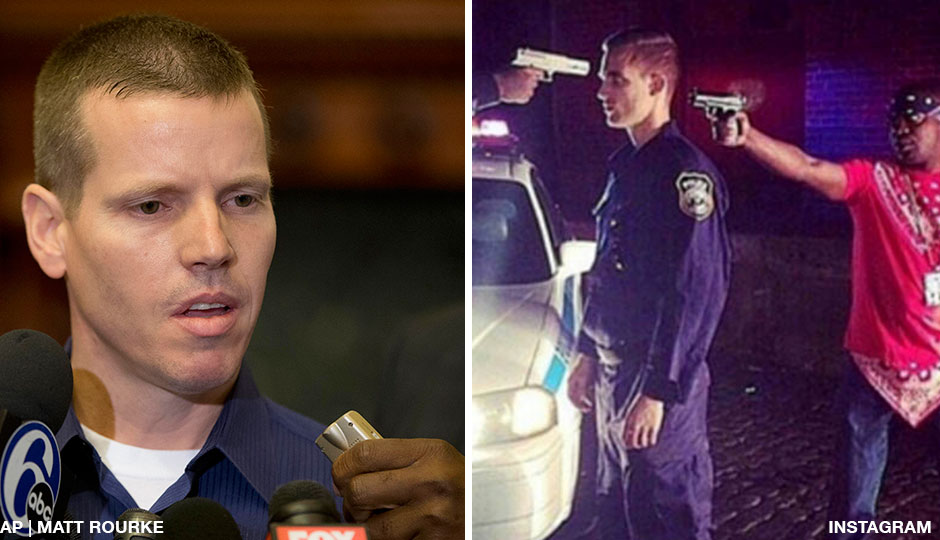This Is How Public Unions Should Respond When Their Members Screw Up

Left: Joe Schulle. Right: Marcell Salters’ controversial Instagram post.
Joe Schulle, the president of the Philadelphia Association of Fire Fighters – Local 22, seems like a good guy. He’s a fierce advocate for his union, which represents Philly’s firefighters and paramedics, but he balances that advocacy with the knowledge — which we sometimes forget — that his members aren’t just another special interest group: They’re also public servants.
Good on him for remembering.
Schulle, you see, was at the center of an incident that happened just before Christmas. He showed that aforementioned balance in action, which probably benefitted the community and helped calm some tensions just as they were beginning to flare. So it seems worth circling back to and highlighting.
Here’s what happened: Back in December — when tensions were still quite high over police-involved killings in New York and Ferguson — a Philly paramedic, Marcell Salters, posted an Instagram of two men aiming a gun at a police officer. It was a stupid, indefensible thing to do, not least because paramedics and police often work side-by-side in emergency situations. Salters was immediately condemned by, well, everybody who mattered, including Mayor Nutter and the police.
Schulle’s response contained two elements.
First, he asserted that Local 22 would fight to save Salters’ job. Which, no surprise right? We’re used to the union heads protecting every two-bit punk who collects a city paycheck around here, right?
Except this: Schulle also let it be known that what Salters did was wrong.
“Not only do we work together in the street, but I count many police officers as good friends, as well as family,” Schulle said in a statement. “Again, most of the members of the Philadelphia Fire Department would most certainly echo these sentiments.”
When I called Schulle earlier this month, he seemed surprised that I’d found the moment noteworthy. It’s not the union’s job to stand in the way of discipline, or to prevent members from being punished when appropriate.
“We have to recognize people make mistakes,” he told me. “And we have to make sure that infraction is met with a fair punishment.”
Which sounds great! But also maybe like a too-rare example of public-minded common sense.
(According to the office of Fire Commissioner Derrick Sawyer, there is no update on whether disciplinary action will be taken against Salters.)
Lately, after all, we’ve been treated to displays — public and local — of public unions forgetting their public mission. Police unions specifically seem unable to accept criticism of bad policing or bad officers. In New York, rank-and-file officers turned their backs on the mayor for (correctly) warning his bi-racial son to be careful during encounters with police. Locally, Fraternal Order of Police President John McNesby spent December wishing eternal damnation on the Bucks County Courier Times for printing a political cartoon mildly critical of police.
Why can’t those guys be more like Joe Schulle?
I talked to University of Toledo law professor Joseph Slater about the balancing act public unions must perform between serving their members and serving the public. “On one hand, their reason for existence is to protect their workers from discipline or discharge, especially when it’s unjust. On the other hand, their workers sometimes do things that cannot be defended,” Slater said. “It’s a tightrope that’s hard to walk, and it’s harder for public unions because they’re in the public eye.”
Fair enough. So how has Schulle managed to succeed, at least in this case? Apparently by keeping both missions in mind.
“We owe the public good, safe service, and good quality service,” he told me.
At the same time, Schulle said, it’s the union’s job to ensure that members are treated fairly during the disciplinary process. That process is designed to fix unwanted behavior by members, and firing should only come into play when other, less severe methods fail to fix the problem. “We do have to serve the public,” he said, “and we have to be here to do it.”
And that job is hard and dangerous, he said. The department just last week held memorial services for Joyce Craig, the Philly firefighter killed December 9th in a house fire. These are, he said, “difficult times.”
In public, at least, Schulle has handled them gracefully: A racially fraught incident disappeared from the headlines after just a couple of days. That was good for Philly and good for the members of Local 22. Let’s hope others learn to follow his example.
Follow @JoelMMathis on Twitter.


